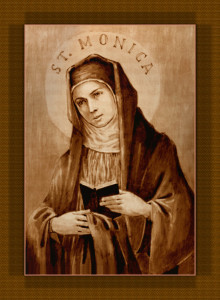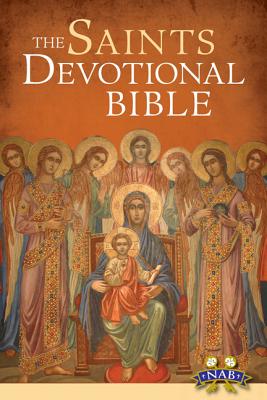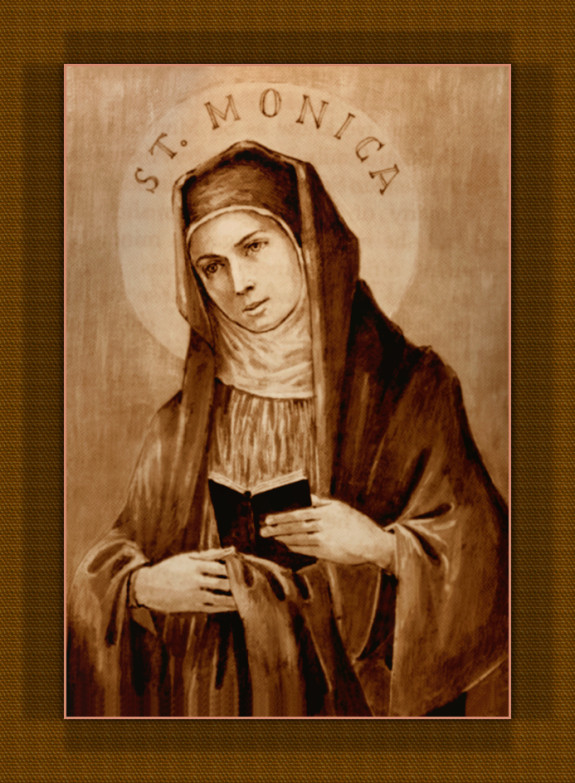Today we continue our regular series called “Learning from the Saints.” Our guide is expert Bert Ghezzi, a dear friend of mine and the author of numerous books including Voices of the Saints, Saints at Heart, and Discover Christ: Developing a Personal Relationship with Jesus.
His newest book is The Saints Devotional Bible, which illuminates the Scriptures with the saints’ own reflections. You can learn more about Bert and his work at BertGhezzi.com.
Today, Bert profiles St. Monica, an early Christian saint and the mother of St. Augustine of Hippo
Most often we think that what made Monica a saint was her long-suffering prayer for the conversion of her son, St. Augustine. But that’s only a small part of the story of her sanctity. I think even had she not borne Augustine, Monica would have deserved recognition as a saint.
 In his Confessions and other writings, Augustine tells us all we know about Monica. Wisely, he described both her flaws and her strengths, so that we get a picture of her willingness to change and grow in Christ. As a young adult, for example, she broke a serious drinking habit when an angry servant girl called her a drunk.
In his Confessions and other writings, Augustine tells us all we know about Monica. Wisely, he described both her flaws and her strengths, so that we get a picture of her willingness to change and grow in Christ. As a young adult, for example, she broke a serious drinking habit when an angry servant girl called her a drunk.
Monica also dealt heroically with challenging family circumstances. Her husband, Patricius, was volatile and unfaithful, but she related to him patiently. Monica’s overbearing mother-in-law also lived with the family, making her marriage even more difficult. But Monica wove good relationships out of these evil possibilities. And she ultimately led both her husband and mother-in-law to Christ and the church.
Perhaps the virtue that contributed most to her holiness was her peacemaking. Augustine said:
“Among people who were quarreling or at discord she showed herself, whenever she could, very much of a peacemaker. She might hear very many bitter things said on both sides. This kind of outpouring of swelling and undigested malice very likely takes place when a person talks to a friend who is present about an enemy who is absent. On these occasions hatred is expressed in its very real crudity and in the bitterest terms possible. But my mother would never report to one person what another had said to her, unless what had been said might help to bring the two together again.
“Ordinary humanity ought to make us feel that we have not done enough if we merely refrain from increasing and exacerbating ill feeling among people by our evil tongues. We ought to go further and try to use our tongues well so as to put an end to ill feeling. This was what my mother was like, and you, Lord, were the master who, deep in the school of her heart, taught her this lesson.”
For thirty years, Monica prayed and schemed for Augustine’s deliverance from his immorality and philosophical confusion. She alternated between faith and worry for him, surrendering him to God, yet traipsing after him to Milan. There finally in 386 Monica watched asSt. Ambrose baptized her son. Then she spent a little time living in community with him and his Christian friends. However, she took sick in 387 and died at Ostia on the way home to North Africa. As she told Augustine just before her death, she felt that no longer had any reason to live:
“My son, as to me, I no longer find any pleasure in this life. What more I have to do here and why I am still here I do not know, since I have no longer anything to hope for in this world. There was only one reason why I wanted to stay a little longer in this life, and that was that I should see you a Catholic before I died. Now God has granted me this beyond my hopes. For I see that you have despised the pleasures of this world and have become his servant. So what am I doing here?”
(Image Credit: Catholic Tradition)
Read more from Bert at his website www.BertGhezzi.com, or check out his many books on Amazon.
 |
 |
 |
 |


